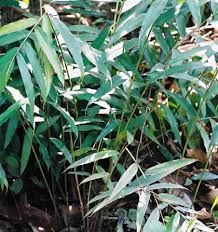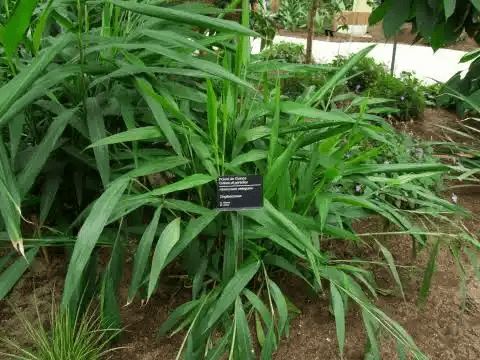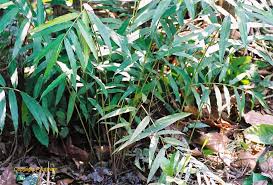Aframomum melegueta, commonly known as Grains of Paradise, is a perennial herbaceous plant that belongs to the Zingiberaceae family, which also includes ginger and turmeric.
This fascinating plant is native to the tropical regions of West Africa and is highly regarded for its aromatic seeds that possess both culinary and medicinal significance.
The leaves of Aframomum melegueta are broad, lanceolate to oblong in shape, and characterized by prominent veins. They are arranged alternately along the stem and can reach lengths of about 20 to 30 centimeters. The leaves exhibit a deep green color and have a glossy appearance.
The plant produces showy, tubular-shaped flowers that emerge from colorful bracts. These bracts can vary in color from green to red and serve to protect the developing flowers.
The flowers are usually white with subtle hints of yellow or pink, and they exhibit a unique symmetry that is typical of the ginger family.
Aframomum melegueta grows from underground rhizomes, which are horizontal stems that store nutrients and allow the plant to spread and reproduce. The stems are erect and can reach heights of around 1 to 2 meters, depending on the growing conditions.
The most distinctive and sought-after part of Aframomum melegueta is its fruiting structure. The plant produces capsules that contain several small, aromatic seeds.
These seeds are responsible for the characteristic flavor and aroma of Grains of Paradise. Each capsule contains numerous seeds arranged in rows, and when mature, the capsules split open to release the seeds.
Aframomum melegueta seeds are renowned for their unique and complex aroma, often described as a blend of citrusy, peppery, and slightly spicy notes.
This distinctive scent is what makes Grains of Paradise a prized ingredient in both culinary and perfumery applications. When used in cooking, the seeds impart a warm and peppery flavor, reminiscent of black pepper but with additional layers of complexity.
Aframomum melegueta is native to the West African region, thriving in the humid tropical climates found in countries like Ghana, Nigeria, and Cameroon. The plant often grows in the understory of dense forests and is well adapted to the humid conditions of its natural habitat.
The Botanical Description of Aframomum melegueta
1. Plant Morphology: Aframomum melegueta grows to 1-2 meters with slender stems and lanceolate green leaves arranged alternately.
2. Flowers and Inflorescence: Clusters of striking flowers form an inflorescence, varying in color from white to pale green.
3. Fruit and Seeds: The fruit, resembling a capsule, splits open to reveal small, dark seeds with a pungent aroma.
4. Root System: A robust, fibrous root system anchors the plant securely and aids in nutrient absorption.
5. Adaptations: Exhibiting resilience, Aframomum melegueta thrives in specific temperature and humidity ranges.
The Geographic Distribution of Aframomum melegueta
1. Native Habitat: Indigenous to West Africa, including Nigeria, Ghana, and Ivory Coast, thriving in tropical climates.
2. Cultivation and Expansion: Cultivated beyond its native range in South America and Asia for economic and culinary purposes.
3. Environmental Preferences: Prefers well-drained soils, consistent rainfall, and tropical temperatures, adapting to specific elevations.
4. Human Cultivation: Humans have extended Aframomum melegueta’s reach through cultivation for culinary and medicinal purposes.
The Chemical Composition of Aframomum melegueta
1. Essential Oils: Rich in aromatic compounds, including terpenes and sesquiterpenes, contributing to fragrance and flavor.
2. Pungent Alkaloids: Seeds contain alkaloids like aframonine, giving them a pungent taste and potential bioactive properties.
3. Phenolic Compounds: Source of antioxidant phenolic compounds, offering protection against oxidative stress.
4. Medicinal Alkaloids: Traditional medicinal uses due to alkaloids with antimicrobial, anti-inflammatory, and analgesic properties.
5. Secondary Metabolites: Presence of flavonoids and tannins contributes to overall bioactivity and potential health benefits.
Nutritional Value of Aframomum melegueta (Grains of Paradise)

1. Gingerols: These are pungent phenolic compounds responsible for the spice’s anti-inflammatory and antioxidant effects, supporting digestion and potentially reducing inflammation-related conditions like arthritis.
2. Shogaols: Similar to gingerols, shogaols contribute to the spice’s spicy flavor and have potent anti-inflammatory and antimicrobial properties, aiding in infection prevention and immune support.
3. Paradols: These compounds, particularly 6-paradol, are linked to thermogenesis, helping to boost metabolism and support weight management by activating brown adipose tissue.
4. Phenolic Compounds: These antioxidants combat oxidative stress, protecting cells from damage and potentially lowering the risk of chronic diseases like heart disease and cancer.
5. Tannins: Known for their astringent properties, tannins aid in wound healing and reduce inflammation in mucous membranes, making them useful for treating burns or gastrointestinal issues.
6. Flavonoids: These antioxidants support cardiovascular health and have anti-inflammatory effects, contributing to overall wellness and disease prevention.
7. Essential Oils: The volatile oils in Grains of Paradise provide antimicrobial and digestive benefits, helping to alleviate stomach discomfort and promote gut health.
8. Alkaloids: These compounds have analgesic and anti-inflammatory properties, which may help relieve pain and reduce inflammation in conditions like joint pain or toothaches.
9. Terpenoids: These contribute to the spice’s antimicrobial and anti-inflammatory effects, supporting its traditional use in treating infections and inflammatory disorders.
10. Minerals (Potassium, Magnesium): Grains of Paradise contain trace minerals like potassium and magnesium, which support heart health, muscle function, and nerve signaling, though present in small amounts.
Read Also: 7 Medicinal Health Benefits of Gynostemma pentaphyllum (Southern Ginseng)
The Medicinal Health Benefits of Aframomum melegueta (Grains of Paradise)

1. Digestive Aid: Grains of Paradise are known to stimulate digestion and alleviate digestive discomfort. The plant’s active compounds can help reduce bloating, gas, and indigestion.
2. Anti-Inflammatory Properties: Aframomum melegueta possesses anti-inflammatory properties that may contribute to the management of conditions like arthritis and joint pain.
4. Weight Management: Research suggests that the compounds in Grains of Paradise can boost metabolism and aid in weight management by increasing energy expenditure and fat oxidation.
5. Antioxidant Rich: The plant is rich in antioxidants that combat oxidative stress and protect cells from damage caused by free radicals, potentially lowering the risk of chronic diseases.
6. Cardiovascular Health: Grains of Paradise may support heart health by helping to regulate blood pressure and cholesterol levels.
7. Pain Relief: Traditional uses include pain relief, especially for menstrual cramps and muscle aches.
8. Aphrodisiac Properties: In traditional medicine, Aframomum melegueta has been regarded as an aphrodisiac, believed to enhance libido and sexual performance.
9. Diabetes Management: Some studies suggest that the plant’s compounds may aid in glucose regulation, which could be beneficial for individuals with diabetes.
10. Respiratory Support: The aromatic compounds in Grains of Paradise may provide relief from respiratory issues, such as coughs and congestion.
11. Gastrointestinal Health: The plant’s antimicrobial properties could contribute to maintaining a healthy gut by combating harmful bacteria.
Read Also: 7 Medicinal Health Benefits of Sandalwood (Santalum album)
The Methods of Usage to Achieve the Provided Health Benefits of Aframomum melegueta (Grains of Paradise)
1. Culinary Delight: One of the most delightful ways to experience the benefits of Grains of Paradise is by using it as a culinary spice. The ground seeds can be added to a variety of dishes to infuse them with a unique flavor profile.
Consider using it in marinades, sauces, soups, stews, and even baked goods for an aromatic and healthful twist.
2. Herbal Infusion: Create a soothing herbal infusion by steeping Aframomum melegueta seeds in hot water. Simply crush a small number of seeds and add them to boiling water.
Allow the mixture to steep for about 10-15 minutes, strain, and enjoy. This method is not only enjoyable but also allows the beneficial compounds to be released into the water, making it easy for your body to absorb them.
3. Spice Blends: Incorporate Grains of Paradise into your homemade spice blends. This can enhance the overall flavor of your dishes while providing the added advantage of its health benefits. Blend it with other spices like ginger, turmeric, or black pepper to create a custom seasoning mix.
4. Tinctures and Extracts: For a concentrated form of the plant’s medicinal properties, consider making tinctures or extracts. Crush the seeds and place them in a glass jar. Cover the seeds with alcohol, such as vodka or brandy, and seal the jar.
Allow the mixture to sit for a few weeks, shaking it occasionally. After the steeping period, strain the liquid and store it in a dark glass bottle. Take a few drops of the tincture diluted in water or tea.
5. Topical Applications: While less common, Grains of Paradise can also be used topically for their potential anti-inflammatory and analgesic properties.
Crush the seeds and mix them with a carrier oil, such as coconut or jojoba oil, to create a topical oil. This oil can be gently massaged into sore muscles or joints for relief.
6. Culinary Oils and Vinegars: Infuse olive oil or vinegar with the essence of Grains of Paradise by placing crushed seeds in a bottle and filling it with your chosen liquid.
Allow the mixture to sit for a few weeks in a cool, dark place, shaking occasionally. Strain out the seeds and use the infused oil or vinegar in your cooking and salads.
7. Herbal Teas and Blends: Combine crushed Grains of Paradise seeds with other beneficial herbs to create flavorful and health-promoting herbal tea blends. Pair it with herbs like chamomile, mint, or hibiscus to enhance both the taste and the wellness benefits of your tea.
The Side Effects of Using Aframomum melegueta Medicinal Plant
1. Digestive Discomfort: Excessive consumption of Aframomum melegueta may lead to digestive issues such as stomach upset, bloating, gas, and even diarrhea. This is particularly true for individuals with sensitive stomachs.
2. Allergic Reactions: Some individuals may be sensitive or allergic to the compounds found in Grains of Paradise. Allergic reactions could manifest as skin rashes, itching, hives, or even more severe reactions in extreme cases.
3. Blood Pressure Fluctuations: Grains of Paradise may have an impact on blood pressure. While some studies suggest that it might help regulate blood pressure, excessive consumption could potentially lead to fluctuations, especially in individuals who are already dealing with blood pressure-related issues.
4. Blood Sugar Interactions: Individuals with diabetes or those taking medications to manage blood sugar levels should exercise caution when using Aframomum melegueta. The plant’s compounds could interact with medications and affect blood sugar levels.
5. Gastrointestinal Irritation: The pungent compounds in Grains of Paradise could potentially irritate the gastrointestinal tract, leading to discomfort and indigestion, especially when consumed in large amounts.
6. Pregnancy and Breastfeeding: Pregnant and breastfeeding women should be cautious with their consumption of Aframomum melegueta. Limited research is available on its effects during these periods, so it’s advisable to consult a healthcare professional before using it.
7. Drug Interactions: As with many natural remedies, Grains of Paradise could interact with certain medications. It’s recommended to consult a healthcare provider if you are taking any medications to avoid potential interactions.
8. Excessive Heat: The pungency of Grains of Paradise might cause a warming sensation in the body when consumed in large amounts. This could be uncomfortable for individuals who are sensitive to heat or suffer from conditions aggravated by heat.
9. Caffeine Sensitivity: Grains of Paradise may have mild stimulant properties due to its compounds. Individuals who are sensitive to caffeine or stimulants should be cautious about their consumption.
10. Children and Infants: It’s generally not recommended to give Grains of Paradise to young children or infants, as their systems might be more sensitive and prone to adverse reactions.
The Scientific Research and Studies of Aframomum melegueta

1. Anti-inflammatory Effects: Ilic et al. (2014) evaluated the ethanolic extract of Grains of Paradise for its anti-inflammatory properties. The study found that the extract inhibited cyclooxygenase-2 (COX-2) enzyme activity and pro-inflammatory gene expression. In a rat paw edema model, the extract reduced inflammation by 49% at 1000 mg/kg, with [6]-shogaol showing efficacy comparable to aspirin. This supports its traditional use for inflammatory conditions like arthritis.
2. Weight Management and Thermogenesis: Sugita et al. (2013) demonstrated that Grains of Paradise extract activates brown adipose tissue (BAT), increasing whole-body energy expenditure in men. The study showed that a single ingestion of the extract boosted metabolism, with compounds like 6-paradol driving thermogenesis. This suggests potential benefits for weight loss and metabolic health.
3. Visceral Fat Reduction: Sugita et al. (2014) conducted a four-week study on 19 non-obese women, showing that daily ingestion of 30 mg of Grains of Paradise extract reduced visceral fat area significantly compared to a placebo. The study confirmed its role in enhancing energy expenditure and reducing body fat, particularly in individuals with low BAT activity.
4. Antidiabetic Potential: Ilic et al. (2010) conducted a 28-day toxicological study in rats, finding that Grains of Paradise extract significantly reduced blood glucose levels in male rats at doses of 450 and 1500 mg/kg. This suggests potential antidiabetic benefits, though liver toxicity at high doses was noted, indicating a need for cautious use.
5. Mood and Sleep Improvement: Pérez-Machín et al. (2025) conducted a pilot clinical trial showing that Vanizem, an Aframomum melegueta extract, improved mood and sleep quality in 30 adults within three days. The extract targeted the endocannabinoid system, reducing anxiety (measured by the Hamilton Anxiety Scale) and enhancing serotonin modulation, supporting mental well-being without sedative effects.
The Safety Precautions and Recommendations In Using Aframomum melegueta Medicinal Plant
1. Dosage Guidelines: When using Aframomum melegueta for medicinal purposes, it is crucial to adhere to recommended dosage guidelines. Excessive consumption may lead to adverse effects, emphasizing the importance of moderation.
2. Allergic Reactions: Individuals with known allergies to plants in the Zingiberaceae family, including ginger, should exercise caution when using Aframomum melegueta. Allergic reactions, though rare, can occur and should be promptly addressed.
3. Interaction with Medications: It is advisable to consult a healthcare professional before incorporating Aframomum melegueta into a medicinal regimen, especially for individuals taking medications. The potential for interactions with certain drugs necessitates informed decision-making.
4. Pregnancy and Lactation: Pregnant and lactating individuals should exercise caution when using Aframomum melegueta. Limited research exists on its safety during these periods, and consultation with a healthcare provider is recommended.
5. Potential Gastrointestinal Effects: Some individuals may experience gastrointestinal discomfort when using Aframomum melegueta. This includes symptoms such as nausea or stomach upset. If these symptoms persist, it is advisable to discontinue use.
FAQs About Aframomum melegueta Medicinal Plant
1. Is Aframomum melegueta safe for daily consumption?
Yes, when used in moderation and following recommended dosage guidelines, Aframomum melegueta is generally considered safe for daily consumption.
2. Can Aframomum melegueta be used during pregnancy?
Pregnant individuals should exercise caution and consult with a healthcare professional before using Aframomum melegueta due to limited research on its safety during pregnancy.
3. Are there any known drug interactions with Aframomum melegueta?
Certain medications may interact with Aframomum melegueta, so it is advisable to consult a healthcare provider before using it in conjunction with other drugs.
4. How can allergic reactions to Aframomum melegueta be identified?
While allergic reactions are rare, individuals with known allergies to the Zingiberaceae family should be cautious. Symptoms may include skin rash, itching, or difficulty breathing.
5. What are the signs of excessive Aframomum melegueta consumption?
Excessive consumption may lead to gastrointestinal discomfort, including nausea or stomach upset. If these symptoms persist, it is recommended to discontinue use and seek medical advice.
Do you have any questions, suggestions, or contributions? If so, please feel free to use the comment box below to share your thoughts. We also encourage you to kindly share this information with others who might benefit from it. Since we can’t reach everyone at once, we truly appreciate your help in spreading the word. Thank you very much for your support and for sharing!
Disclaimer: This article is for educational and informational purposes only. The health benefits described are based on scientific research and traditional knowledge. They are not a substitute for professional medical advice, diagnosis, or treatment. Always consult a healthcare professional before using any herb or natural remedy for medical purposes.
Read Also: Waste Management Startups: The Future of Sustainable Waste Management

